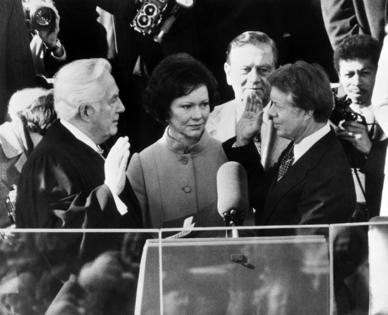Bill Torpy: Carter's political duplicity, brutal defeat and ultimate goodness
Published in Op Eds
Jimmy Carter’s unlikely candidacy for president was nearly derailed by honesty.
Carter, a Southerner and evangelical Christian, was trying to tell a writer from Playboy magazine (which we only read for the articles) he was a normal, red-blooded man but also a sinner.
“I’ve looked on a lot of women with lust,” he said. “I’ve committed adultery in my heart many times.”
The comments came out six weeks before the 1976 presidential election and caused a furor that today seems quaint.
This, of course, was long before having sex with a porn star, and then paying her off, was no longer a campaign killer.
With Carter’s death this week, the tributes are gushing about a man who lived for a century and cheated death for a decade. His resilience has been a testament to his toughness, his sturdy, farm-bred constitution and a willingness to keep on keeping on.
His legacy has become bifurcated legend: Mediocre president and outstanding second act after a humbling 1980 defeat at Ronald Reagan’s hands. (There’s a pushback from the left that his presidency wasn’t as bad as it seemed. And some on the right insist he wasn’t the postpresidential miracle worker he’s been made out to be.)
Carter, like most humans, was complicated. To become president, one must be cunning, ambitious and possess a ruthless drive bordering on evil genius. The Sunday school teacher with an easy smile had all of that. And an extra dose of empathy.
He grew up in a farm without indoor plumbing or electricity. It was Lincolnesque and will be the last time a president hails from such rustic, humble beginnings.
He grew from small-town boy to U.S. Naval Academy grad to submarine officer who returned to Plains to rejoin the family farming business. He soon joined the school board and accepted, with little protest, the segregation of the day.
In 1962, he ran for the state Senate as an outsider (a recurring theme in his campaigns) and lost because there actually was a steal. Carter convinced an Atlanta Journal reporter to investigate ballot stuffing in Quitman County and a judge ultimately ordered a new election, which he won. This fortified his later zeal to promote fair elections.
A decade ago, I interviewed Carter and wrote about the historic 1963 session in Georgia’s Senate, which included the first Black legislator since Reconstruction: “Accustomed to farmers’ hours, (Carter) walked to the Capitol every day at 7 a.m. to read each bill he would vote on that day, and he switched hotels to get away from his boisterous contemporaries. Carter’s work ethic endeared himself to many, but others considered him an interloper who used the courts to steal the election.”
After two terms in the Legislature, Carter ran for governor in 1966 but lost to ardent segregationist Lester Maddox. Carter wasn’t going to let that happen again.
In 1970, former Gov. Carl Sanders, who first came to that job when Carter arrived at the Capitol, decided to run for governor again.
“Then Jimmy Carter jumps in,” Sanders told me not long before his death in 2014. “Carter, believe it or not, ran a segregated race, one that he was connected with George Wallace of Alabama.”
Carter had research showing Sanders was vulnerable to suggestions he supported integration. At the time, Atlanta Constitution political editor Bill Shipp noted that Carter himself never alluded to race, “but mysteriously, thousands of leaflets cropped up all over the state in parsonage mailboxes, barber shops and beauty salons linking Sanders socially with Negroes.”
Carter won the race and then, at his inauguration, surprised the bigots, announcing: “The time for racial discrimination is over.”
It was a diabolically clever move, winning the governorship as a sheep in wolf’s clothing.
He went on to become the progressive face of the New South, modernizing government and removing some of its inherent meanness toward Black residents.
In 1974, Carter announced he was running for president. Then-Constitution editor Reg Murphy, who didn’t think much of Carter — he found him to be sanctimonious — wrote a column headlined “Jimmy Carter is running for WHAT?”
(Note: I shook Carter’s hand at a Chicago area shopping mall as an 18-year-old but voted for the Republican guy who was spoofed for stumbling down Air Force One’s steps. I guess it was my Northern/Midwestern bias.)
Carter’s presidency has been chewed over in recent days. His outsider status that helped him reach the presidency also made it hard for him to build coalitions needed to govern.
He carried his own luggage and shed some presidential luxuries. It was indicative of a humble public servant, although some saw virtue signaling. A sluggish economy and sense he was weak on national security (even though he increased defense spending) doomed him in a showdown with an ex-Hollywood actor who liked to be photographed chopping wood at his ranch.
Carter, who was 56 when leaving the White House, was left to play out his days as a defeated ex-president. That he did not do.
He and his beloved wife of 77 years, the late Rosalynn, created The Carter Center, which zealously fought disease overseas, advocated for fair elections and championed human rights. In 2002, he was awarded the Nobel Peace Prize.
He also threw himself into Habitat for Humanity and helped build nearly 4,500 homes through the decades.
Unshackled by the manipulative demands of politics, he let his innate goodness shine and taught retirees there’s no ultimate goal line in life. Just a continuous playing field.
©2024 The Atlanta Journal-Constitution. Visit at ajc.com. Distributed by Tribune Content Agency, LLC.




























































Comments